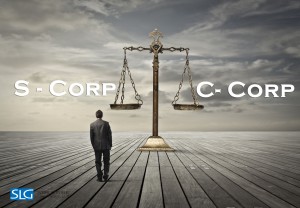Once the decision has been made to incorporate the startup instead of operating as a sole proprietorship, a partnership, or a limited liability company, the decision-making responsibilities are still not over. The next important decision to be made is whether to operate as a C-corporation or to elect to operate as an S-corporation. The C and S refer to the different IRS code selections. This can be a complicated decision based on many factors, including the business’ future goals for growth and taxation issues. The C-corporation is the standard corporation and the most common corporation in the US; it shares many qualities of the S-corporation. Both offer limited liability protection, require separate legal entities and state filings, have shareholders, directors, and officers, and both are required to follow the same internal and external corporate formalities and obligations. While they share many similarities, deciding the best option for your startup company takes in-depth consideration. Below are only a few examples of the pros and cons of a C-corporation vs. S-corporation. Working with an experienced California start-up attorney can help you choose the right business entity type for your startup and explain all of the pros and cons of a c-corporation vs. s-corporation.
C-Corporation Pros and Cons
There are many benefits to having a C-corporation and the following are just a few that stand out. C-corporations are very flexible when it comes to investors and leadership of the corporation. The law sets out no restrictions on the number of shareholders or type of shareholders that may participate in the ownership of the business, nor any restrictions on where the shareholder may be located. This presents options for more investors to purchase different classes of stock so that shareholder rights can be varied between classes, thus opening up more options for investors and growth of the business. In addition to flexibility and unlimited potential growth, a C-corporation has the widest range of deductions and expenses allowed by the IRS, ie. It can set up medical reimbursement and other employee benefits, and deduct the costs of running these programs, including all premiums paid. C-corporations are great for businesses that sell products, has a storefront and employees, and may or may not have a warehouse where the inventory is kept.
On the other hand, C-corporations have some setbacks that should be taken into consideration. C-corporations are more expensive to start and are subject to double taxation. Simply put, this means that the profits of the corporation are taxed first and then any payouts to shareholders are taxed again. This also means that shareholders do not have the right to write off corporate losses on personal tax returns. The skilled corporate attorneys at Startup Company Counsel have the knowledge and experience that can help businesses avoid or reduce these double taxes. C-corporations also have more regulations and formalities and experience more government oversight than other entities.
S-Corporation Pros and Cons
Unlike C-corporations, S-corporations are not double-taxed and are instead allowed to participate in pass-through taxation. There is no tax on the level of the corporation itself, but instead profits are only taxed on each shareholder’s individual tax returns. Shareholders of S-corporations can also write off losses of the corporation on their personal returns to help adjust for other sources of taxable income. Other advantages include protected assets, tax-favorable characterization of income, straightforward transfer of ownership, and heightened credibility. S-corporations are ideal for many service-oriented businesses to avoid being characterized as a Personal Service Corporation (PSC) by the IRS. PSCs are C-corporations classified by the IRS as providing a service to the general public.
While the tax benefits of an S-corporation are substantial, these companies have some potential disadvantages and are subject to significant limitations on growth, ownership, and type of business. Generally speaking, most S-corporations cannot have over 100 shareholders at one time. Furthermore, all shareholders are required to be residents or citizens of the United States, which can eliminate some possibly lucrative investments. Shareholders are also required to be individuals, which prevents any other companies from investing in the business. Finally, the company can only offer one class of stock, which limits the flexibility in prioritizing some shareholders over others. Because of this one-class-of-stock restriction, the corporation cannot easily allocate losses or income to specific shareholders.
Consult with a California Startup Attorney Today
The decision regarding C-corporation or S-corporation election is an important one and can have many implications for your startup. To have a better understanding of the differences and your options, contact our experienced corporate lawyers. It is strongly suggested to always thoroughly discuss your options with an experienced California startup attorney before making such an important decision. Call Startup Company Counsel at 408-441-7555 or send us an email for assistance today.




